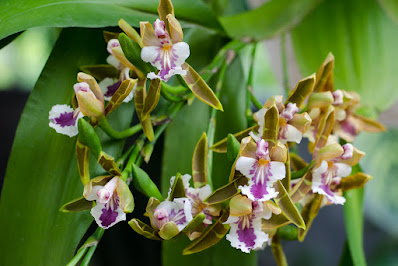Aspasia epidendroides - Epidendrum-Like Aspasia blooms in the winter to spring with longlasting, color variable, fragrant flowers that are open...
Aspasia epidendroides also called as Epidendrum-Like Aspasia, Aspasia barclayi, Aspasia fragrans, Odontoglossum aspasia, is a species of the genus Aspasia. This species was described by John Lindley in 1834.
DESCRIPTION OF ASPASIA EPIDENDROIDES - EPIDENDRUM-LIKE ASPASIA
Aspasia epidendroides is native to Central America to Colombia. It is found growing on trunks near the forest floor in the coastal plain, broad leaf forest in Colombia, Costa Rica, El Salvador, Guatemala, Honduras, Nicaragua, Panamá at elevations of 0-1000 meters above sea level.
It is a large sized, hot to warm growing epiphyte with green, laterally compressed pseudobulbs. The leaves are 2-3, apical, linear-oblong, to narrowly lanceolate, acute or acuminate, subcoriaceous.
Epidendrum-Like Aspasia blooms in the winter to spring from the up to 25 cm long, erect, basal, 4-8-flowered racemose inflorescence that arise on a newly formed pseudobulb with scarious, appressed, acuminate floral bracts. The flowers are longlasting, distichously arranged, color variable, fragrant and open successively; the sepal is fleshy and green yellowish with purple-brown blotches in the edges and in some cases purple-dark brown; the lip is white suffused with purple.
ASPASIA EPIDENDROIDES - EPIDENDRUM-LIKE ASPASIA CARE
Cultural information should only be used as a guide, and should be to be adapted to suit you. Your physical location; where you grow your plants, how much time you have to devote to their care, and many other factors, will need to be taken into account. Only then can you decide on the cultural methods that best suit you and your plants.
Light:
Aspasia epidendroides needs a light level of 20000-35000 lux. The plants grow best in bright, but slightly diffused light and need protection from direct midday sun.
Temperature:
The average temperature of the summer day is 27-30 ° C, the night 18-20 ° C, which gives a daily difference of 9-11 ° C. The average temperature of the winter day is 27-28 ° C, the night 17-18 ° C, giving a daily difference of 9-11 ° C.
Humidity:
Epidendrum-Like Aspasia needs the humidity of 75-80% for most of the year, but drops to 70% over a 3-months period in winter and early spring. Too dry air has a negative effect on the development of the plant: its growth is inhibited, and the leaves begin to turn yellow and dry out. The higher temperature, the higher the humidity should be, and the higher the humidity, the more often and longer it is necessary to ventilate the room where the plants are contained, otherwise the probability of rotting and various kinds of fungal diseases. Good air movement is essential while the plants are in leaf and growing.
Substrate, growing media and repotting:
Aspasia epidendroides can be grown in pots with any good epiphytic mix such as treefern, bark, or osmunda. The plant can also be mounted on cork or treefern slabs. Fixed plants require high humidity and at least daily watering in summer, and may even need to be watered several times a day if the weather is dry and very hot.
Watering:
Epidendrum-Like Aspasia should be abundantly watered during active growth, but excellent drainage should be ensured. When new growths reach maturity in autumn, the amount of water should be gradually reduced.
Fertilizer:
During the active growth, the plants should be fertilized every week 1/4-1/2 of the recommended dose of fertilizer for orchids. A fertilizer with a high nitrogen content is beneficial from spring to mid-summer, and a fertilizer richer in phosphorus should be used in late summer and autumn.
Rest period:
In winter, the amount of water for Aspasia epidendroides should be reduced, but they can not remain dry for too long. In general, such conditions can be achieved by fairly regular morning fogging, with light, sparse watering, which should provide the necessary dry rest, but it will not lead to drying of the plant. If pseudobulbs begin to wrinkle, increase the amount of water. Fertilization should be reduced or eliminated until spring, when new growths occur and more watering is undertaken.















COMMENTS